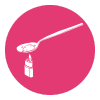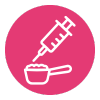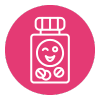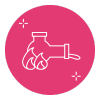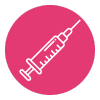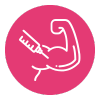
Written by:

Medically Reviewed by:
Last Updated:
January 22nd, 2025
Drug addiction
According to the most recent UNODC’s World Drug Report 2022, it is estimated that more than 284 million people worldwide used some kind of drug in 2020, which is a 26% increase over the previous decade. Countless lives have been impacted by drug abuse, but with the right knowledge and support, even anyone struggling with drug addiction can overcome and turn their lives around. At Banbury Lodge, we aim to shed light on struggles that those with addictions face every day as well as to show how understanding, empathy and community can make a lasting recovery possible.
What is drug addiction?
Drug addiction is a condition that can be defined by obsessive drug seeking and use that is generally impossible to control, regardless of the destructive consequences. Initially, the decision to use drugs is voluntary but the changes that occur in the brain as a result of continual drug use can challenge an addicted person’s self-control and hinder their ability to resist the urge to consume drugs.
Drug addiction is a complex disorder as the changes it induces in the brain can be persistent. This means more than just an immediate danger of relapse after years of sobriety. This is why drug addiction is considered a “relapsing” condition.
What are the main causes of drug abuse?
- Stress
- Financial trouble
- Anxiety
- Depression
- Loneliness
- Peer-pressure
- Family problems
- Poor environmental choices
- Mental health disorders
How common is drug addiction in the UK?
Getting an accurate estimate of the scope of drug addiction in the UK can be challenging because many individuals who struggle with drug addiction do not seek assistance. Considering that the majority of drug users are not in touch with drug treatment services, it is highly likely that the actual number of individuals affected by drug addiction in the UK is significantly higher than the 275,000 UK residents who sought help from drug treatment services in 2019/2020.
The economic impact of drug abuse on the UK is substantial as well. According to the government’s chief drug policy advisor, illicit drug use costs the country nearly £20 billion per year, rerouting resources from important areas such as health, education and housing.
How does drug addiction develop?
Drug addiction is a complex condition that involves a combination of factors, including genetic, environmental and personal factors. Here are some ways that drug addiction can develop:
- Biological factors: Genetic factors play a significant role in drug addiction. Studies have shown that addiction can run in families and some individuals may be more susceptible to addiction due to genetic differences in their brain chemistry.
- Environmental factors: Exposure to drugs at an early age, peer pressure and a lack of parental supervision can increase the likelihood of drug addiction. Other environmental factors such as stress, trauma and poverty can also contribute to drug addiction.
- Psychological factors: Individuals who struggle with mental health disorders such as depression, anxiety and post-traumatic stress disorder (PTSD) are at a higher risk of developing a drug addiction. Drugs can be used as a way to self-medicate to cope with emotional pain.
- Social factors: Social factors such as isolation, lack of social support and low self-esteem can increase the risk of drug addiction. Drugs can be used as a way to escape social problems or to fit in with a particular group.
Overall, drug addiction is a complex and multifaceted condition that involves a combination of biological, environmental, psychological, social and behavioural factors.
If you are unsure whether or not your drug use is under control, you can take this quiz to find out more. The DAST-10 (Drug Abuse Screening Test) is a short 10-item screening tool used to evaluate drug abuse.
What are some common drug addictions?
Drug addictions have become a harsh reality for many around the world, with commonly abused drugs ranging from prescription medications to illicit street drugs. Some of the more common drug addictions are:
Cocaine addiction
Cocaine addiction is an intense physical and psychological condition that is caused by frequent use of the drug and causes a person to compulsively seek out the drug.
Crack Cocaine addiction
This potentially life-threatening condition poses a serious danger due to its high probability of dependence and abuse, along with the risk of severe side effects.
Heroin addiction
An opioid with an easily developed dependency that can be quite difficult to overcome because of its powerful effects on the brain.
Ecstasy addiction
Ecstasy (also known by the name MDMA) addiction is prevalent in users who take this synthetic drug frequently in high doses for recreational purposes.
Meth addiction
Often an extremely powerful synthetic stimulant drug that lends itself to abuse due to its release of dopamine, affecting the central nervous system.
Hallucinogen addiction
This condition can be difficult to recognise since the effects are largely psychological rather than physical in nature. Click the button below to learn more.
Cannabis addiction
Cannabis addiction involves compulsive use, causing dependency and harm to health.
Ketamine addiction
Ketamine addiction leads to dependency, impairing mental health and daily life.
LSD addiction
LSD addiction affects mental health, causing dependency on hallucinogenic effects.
Monkey Dust addiction
Monkey Dust addiction leads to dependency, triggering severe mental and physical harm.
Steroids addiction
Steroids addiction causes dependency, impacting physical health and emotional balance.
GHB
addiction
GHB addiction creates dependency, leading to harm in mental and physical health.
GBL
addiction
GBL addiction develops dependency, severely affecting physical and mental well-being.
Is there a difference between drug abuse and addiction?
The words addiction and abuse may be confused as having the same meaning, but drug addiction and abuse are two different things. Both of them have the possibility to affect a person’s life, but the difference is the degree to which they control the person. The primary difference between drug abuse and drug addiction is that addiction takes over a person’s life.
What are the signs of drug addiction?
Being mindful of your well-being and that of those you are close to is paramount. If you or someone you care for might be facing drug addiction, these statements may serve as an initial guide for assessment.
- I’ve attempted to cut down or quit the drug but feel powerless to stop
- I’m neglecting work, studies, or responsibilities due to excessive drug use.
- I hide my drug use from others
- I frequently stay awake at night to use the drug which compromises my sleep
- I feel shame or depression after using the drug
- I experience unpleasant withdrawal symptoms when I can’t access the drug
Are you enabling drug addiction?
If your loved one is experiencing drug addiction, there will be a strong desire to assist by any means necessary… but are you enabling? If you answer yes to any of these questions, you are enabling:
- Are you putting the persons with addiction needs before your own regardless of the effect on your own well-being?
- Are you ignoring the issue and pretending everything is fine?
- Do you find yourself lying on their behalf to protect them from the consequences of their actions?
- Have you made excuses for the behaviour of the person with addiction?
- Are you not maintaining set boundaries?
- Are you repeatedly giving them money and supporting them financially?
- Do you find yourself taking on their responsibilities or commitments yourself?
While your intentions may seem well and good, these actions only preserve your loved one’s addiction and hinder their recovery. Breaking the habit of enabling is difficult and it is important to take care of yourself, find your own support group and seek professional help.
How can I help a loved one with drug addiction?
At Banbury Lodge, we recognise the emotional distress that comes with witnessing a loved one struggle with drug addiction. However, you are not alone and there is support available. It can be overwhelming to know where to start or what resources are available, but following the steps outlined below can serve as a useful starting point in accessing the help your loved one needs.
- Educate yourself by researching drug addiction and treatment options.
- Talk openly and honestly about their drug addiction without judgement and always emphasise support and care.
- Connect with medical professionals to develop a drug addiction programme for your loved one.
- Be sure to set distinct boundaries on behaviours and actions you will not tolerate. Consistently enforced these boundaries in a supportive way.
- Be patient as It is normal for people with drug addictions to have desires and slips into old habits. Patience and understanding are key during these difficult times. but be sure to offer positive reinforcement when they are successful at avoiding temptation or making positive steps forward.
Can drug addiction be overcome?
Taking the first step to conquering addiction can be intimidating. It is important to remember to have compassion for yourself; everyone faces challenges at some point in their life story – it simply takes resilience and courage to come out on top of yours.
At Banbury Lodge, we recognise the emotional toll drug addiction can have on individuals. If you or someone you know is struggling with drug addiction, our rehab treatment programme is here to help. Remember that you are not alone in the recovery process.
With our drug detox programme and drug rehab programmes, our dedicated team at Banbury Lodge are prepared to offer professional support and compassion every step of the way. Reach out today for help that will ensure lasting results.
Frequently asked questions



